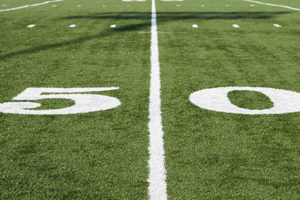Retired NHL player Eric Lindros filed a sports defamation lawsuit, in Canadian court, against referee-cum-columnist Paul Stewart. Lindros isn’t impressed with a post penned by Stewart for the Huffington Post, and former power forward wants $250,000 in compensation.
Is Canadian defamation law on Lindros’ side? What about U.S. libel law? Let’s discuss.
Why Lindros Is Suing An NHL Referee For Libel
Stewart penned an online missive for the Huffington Post entitled “Hecklers, Hooligans and the Striped-Shirted Maitre D” in which he waxed poetic about life as an NHL ref, commercial break banter, and fan friendships.
Stewart also served up some behind-the-scenes gossip and dished on a few players, including the Steve Francis of professional hockey, Eric Lindros. Unabashed in his disdain for the former Flyer, Stewart says: “Eric Lindros was a player I got off with on the wrong foot and we never developed a rapport because neither he nor I wanted one.”
Stewart goes on to recount: “During the delay, I made small talk with several of the Devils and Flyers on the ice. I said hello to Mark Recchi and talked to Bernie Nicholls. I then tried to greet the 19-year-old rookie Lindros. “‘Hey, Eric. How are things going? How’s your dad?’ I asked. “The response: ‘[Bleep] you. Just drop the [bleeping] puck already.’ “Lindros was apparently in a bad mood because he’d recently missed 12 games with a knee injury, the team was in a losing skid, and he’d had a tough game in New Jersey. This game was also played about a week after Lindros had to go to court in Toronto after the Koo Koo Bananas incident. You know what? Those were his problems, not mine. But we were about to have a mutual problem. “Right off the opening faceoff, Lindros bulled forward and drilled Nicholls under the chin with his stick. I ditched Lindros on a high-sticking penalty. “Before the game, I had brought a tube filled with posters to Flyers’ equipment manager Jim “Turk” Evers. The posters, which depicted Recchi and Lindros, were to be autographed and then donated to a charity auction. I had done a similar thing in other cities, such as a Cam Neely and Ray Bourque poster in Boston, and a Mario Lemieux and Jaromir Jagr in Pittsburgh. “After the game, I went to Turk to collect the poster tube. “‘Stewy, you’re not going to like this,’ Evers said. ‘I don’t have them.’ “‘What do you mean you don’t have them?’ I asked. “‘Well, Rex signed the posters but when Eric found out they were for you, he tore every one of them up. I’m sorry about that.’ “I never spoke to Eric Lindros again.”
Lindros’ Sports Defamation Lawsuit
Lindros swears that Stewart is telling stick stories. Most notably, Lindros contends that:
- He never cursed at Stewart during their first relayed encounter; and
- The incident with the posters never happened.
So, Lindros filed a libel lawsuit. At first, he asked for a few million dollars but has since lowered that figure to $250,000.
Can Lindros Win This Case?
Will Lindros win? In Canada, he may have a shot.
Currently, Canada has the most plaintiff-friendly libel laws in the English-speaking world. In several regards, Canadian defamation law is the opposite of U.S. defamation law. Unlike American slander and libel plaintiffs, Canadian claimants don’t have to prove damages or intent. Moreover, Canadian slander and libel law operates on a “reverse onus” standard, meaning it’s the defendant’s responsibility to prove the statement was either:
- Fair Comment or Criticism;
- Truthful;
- Honest Reportage; or
- Innocent Dissemination.
In the Lindros sports defamation case, it may come down to whether or not Turk – the equipment manager who relayed the poster-ripping message — will testify to that fact. If he does, Stewart could emerge victorious in this case; if he doesn’t, Lindros, in theory, could win this sports defamation claim.
Would Lindros Win His Defamation Lawsuit In A U.S. Court?
What about in a U.S. court? Would Lindros’ chances be as good as they are in Canadian court? In a phrase: probably not.
Unlike Canadian slander and libel claimants, the majority of U.S. defamation plaintiffs must prove falsity, damages, and some sort of negligence on the part of the defendant. Some American defamation plaintiffs don’t have to prove damages if the statements are deemed defamatory per se, meaning the communication is inherently damaging (i.e., calling someone a criminal). Though the majority of states do allow for defamatory per se claims, some don’t.
Since Stewart’s article appeared on Huffingtonpost.ca, Lindros also included Huffington Post, AOL Inc. and AOL Canada Inc. as defendants.
Further Reading And International Defamation Attorney Contact
For a quick reference chart that outlines the difference between Canadian and U.S. defamation law, go here. To read more about Canadian defamation standards, go here; for U.S, here.
Kelly / Warner has extensive experience with cross-border defamation lawsuits – particularly Internet defamation cases.
To speak with a sports defamation attorney, with international experience, get in touch with Kelly / Warner Law today.



Leave a Reply
Your email is safe with us.